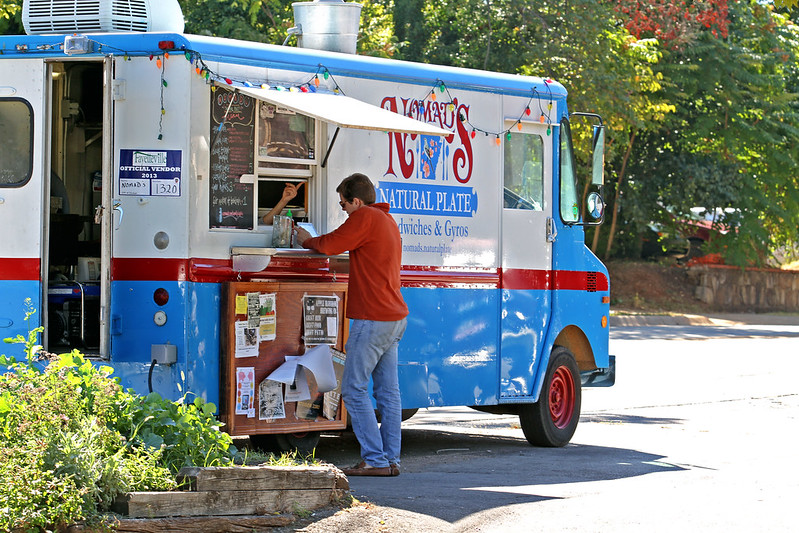
A customer places an order at Nomad’s Natural Plate, a mobile business that frequently sets up shop in the Nightbird Books parking lot on Dickson Street.
Photo by Todd Gill, Flyer staff
Fayetteville aldermen last week passed new regulations that should make it easier for mobile vendors to operate around town.
The new laws, brought forth by Alderman Matthew Petty, include changes to the previous mobile vendor regulations, but also establish specific rules for roving food trucks and businesses that operate inside “mobile vendor courts.”
Changes to previous laws
Vendors who want to operate a temporary business on private property in one specific location can now stay there for six months with a permit from the city’s planning division. The previous law only allowed vendors to stay in one spot for 90 days before they had to apply for an extension from the Planning Commission.
Those businesses would not be allowed to match or duplicate the primary food or beverage sold by a permanent business located immediately adjacent (and on the same side of the street) as their mobile vending unit. In other words, a taco stand couldn’t operate directly next door to Taco Bell. They could, however, serve Coca-Cola or rice since neither food is a primary product.
Vendors who wish to stay in business longer than six months would have two options.
They could either get a permit for a new location at least a quarter mile away, or they could apply for an annual permit from the Planning Commission to stay in their original location.
Regardless of which option they choose, vendors must pay a $100 permit fee each year unless they operate inside a mobile vendor court such as the Yacht Club on College.
Mobile vendor courts

» Download new laws (PDF)
Property owners can create a mobile vendor court on their land if they’re approved for a Conditional Use Permit.
Court owners may be required to include landscaping elements, permanent utility connections, and adequate restroom facilities.
Mobile vendors operating in a court aren’t required to obtain an individual permit, but must provide the city with a site plan, copies of necessary health permits and other information.
Aside from offering residents a new place to grab a bite to eat, mobile vendor courts can give would-be restauranteurs the chance to test the market without making a huge upfront investment.
Several businesses that first opened inside an Airstream trailer at the Yacht Club eventually transitioned into brick-and-mortar locations including Grey Dog boutique, Hawaiian Brian’s, Pigmint Floral and Event Design, and Bouchee Bistro.
At least one new mobile vendor court is planned in Fayetteville. Local bar and restaurant owner Zac Wooden, who recently purchased the building at 402 W. Dickson Street (former home of The Phoenix), said he plans to convert the outdoor patio area into a food truck court sometime this year.
Roving food trucks and trailers
Vendors that plan to move from one place to another, like trailers pulled by a vehicle or the more traditional “food truck” type of businesses, can either park on private land (with permission from the property owner) or apply for a permit to operate in public areas.
A drawing will be held each year to determine which vendors are allowed to set up shop in public parking spaces or inside city parks. One-third of all vendors who apply each year will be awarded a permit through the lottery, with a minimum of three permits granted each year.
Peter Nierengarten, city sustainability and resilience director, said the initial lottery will take place before November this year, but a date hasn’t been set.
Food truck owners are required to pay the annual $100 mobile vendor fee and comply with health laws, but must also pay appropriate parking fees if they plan to do business in public parking spaces.
Food trucks operating on public property are limited to parallel parking spaces and must fit completely into one space. Food trucks can only sell food from the sidewalk-facing side of their truck, and are prohibited from parking on the same side of a street directly in front of a restaurant or a parking pay station. They must also move (“bump”) to a new location at least 325 feet away every four hours.
Permitted vendors who want to sell food in a city park would need to get approval from the Parks and Recreation Division, and would not be allowed to work in areas that are being actively served by contracted concessionaires.
The new laws do not apply to lemonade stands, fireworks vendors or nonprofit groups.

